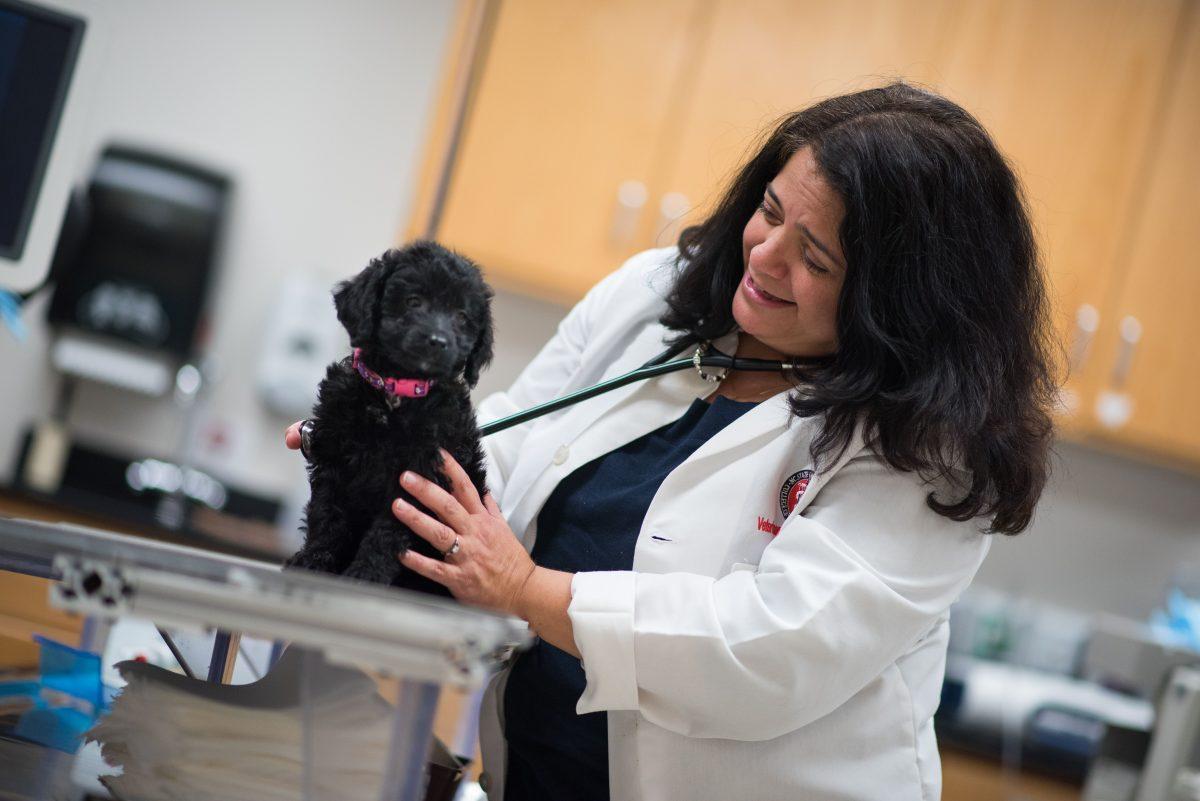Veterinarian professionals from the College of Veterinary Medicine’s Small Animal Services’ Cardiology department talk about protecting dogs and cats from heart disease.
Rachel Van Zile, a second-year cardiology resident, said in a statement that cardiology is an exciting specialty where veterinarians use cutting edge technology to help give pets with heart disease as long and happy a life as they can.
“The best part of our week is when we are able to fix a puppy’s congenital heart defect with minimally invasive procedures and give them a chance to live a long and happy life with their new family,” Van Zile said.
Dr. Teresa DeFrancesco, a professor of cardiology and critical care at the NC State College of Veterinary Medicine, is a part of the team at the Small Animal Services’ Cardiology department, which is part of NC State’s Veterinary Hospital. She said heart disease is common in small animals, and early exams are important for heart disease detection.
“Heart disease, at least in the small animal world, is thought to occur in about 10% of dogs and cats across the board, and it is a common cause of a terminal issue to a pet,” DeFrancesco said. “The primary care veterinarian always listens to your pet with a stethoscope. They’re listening for a heart murmur or an irregular heartbeat, so even in a seemingly healthy pet, there can be some heart disease that’s detected just based on exams. So, it’s important to have your annual exams with your veterinarian.”
DeFrancesco said some symptoms of heart disease can be vague like your pet simply slowing down, which can be a sign of other issues like arthritis or kidney disease. More prominent symptoms include increased respiratory rate, increased respiratory effort, lethargy, inappetance, coughing in dogs and hiding in cats. DeFrancesco said the changes in breathing are the most concerning.
“When your dog or cat is exhibiting signs of heart disease, probably the one that is most concerning is shortness of breath, because that may signal that the pet is in congestive heart failure where fluid builds up in the lungs or around the lungs,” DeFrancesco said.
Bridges said the key to a healthy heart is a healthy lifestyle.
“Watching their weight, taking them on walks, doing routine healthy things, just like we have to do for ourselves, making sure they’re on heartworm preventatives, going to their doctors appointments routinely,” Bridges said.
DeFrancesco and Bridges said heartworm prevention is important to prevent heart disease as heartworm can cause irreversible damage to the heart. Heartworm prevention is especially important in the South.
“Maintaining good flea, tick and heartworm prevention, because we are in the South and there are lots of mosquitos and high humidity, mosquitos are the vector that transmits heartworm,” DeFrancesco said. “Your chances of getting heartworm, if you’re not on heartworm prevention, is unfortunately high. So, it is important to have your pet on heartworm prevention, and I would say the same about flea and tick protection.”
DeFrancesco said it’s important to know that heart disease is not always terminal.
“There are some heart murmurs that progress really slowly, or some heart murmurs that are relatively benign, and so serial monitoring of these pets is how we’ll determine how they’re going to progress,” DeFrancesco.
Bridges said if pet owners have any concerns that their pet may be showing signs of heart disease, they should contact their primary veterinarian.
“If they’re worried about it at all, they should contact their primary veterinarian and have an exam and talk to them about it,” Bridges said. “Be very open about their concerns. Their primary veterinarian should be the first person they reach out to for any concern that they have with their pet.”
DeFrancesco said the cardiology department at NC State sees a wide range of cases, making it a great place to learn.
“We at NC State see the whole gamut,” DeFrancesco said. “We see the asymptomatic murmur workup and then we see sick patients with heart disease. We see it all. It’s a great training situation for our students, residents and house officers in training.”
Van Zile said she loves working with the cardiology team and learns something new every day.
“I love that my core job is to continuously be learning new information, techniques, etc. in the world of cardiology as it relates to all species,” Van Zile said. “Each day brings a new challenge.”
Van Zile said any students interested in small pet cardiology should get involved with their local veterinarian community.
“Working as a veterinary assistant while in undergrad helps you understand the veterinary career field and get valuable hands-on experience that will make you a better veterinarian in the future. If you are in veterinary school already, seeking out mentorship from the cardiologists at your school will greatly help you when the time comes to start applying for residency programs.”













